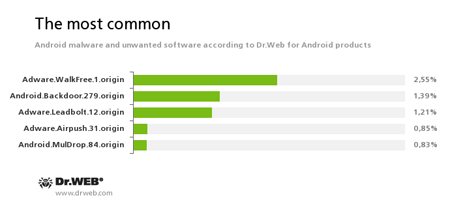January 2016 mobile malware review from Doctor Web
January 29, 2016
PRINCIPAL TRENDS IN JANUARY
- Detection of a large number of Trojans on Google Play
- Detection of yet another Trojan on the Android device’s firmware
Mobile threat of the month
Google Play is still considered to be the most secure app store for Android devices’ users. However, virus makers continue their attempts to incorporate malicious programs into Google Play applications. Thus, in January 2016, more than 60 games were affected by a Trojan. Doctor Web security researchers dubbed it Android.Xiny.19.origin. The main threat of this Trojan lies in its capability to download and run arbitrary apk files upon cybercriminals’ command. Besides, Android.Xiny.19.origin can download applications, prompt a user to install different software, and display annoying advertisements. For more information about this incident, refer to the news article.
According to Dr.Web for Android
- Adware.WalkFree.1.origin
An unwanted program module that is incorporated into the Android applications and is responsible for advertising on mobile devices. - Android.Backdoor.279.origin
A Trojan that performs different malicious functions upon cybercriminals’ command. - Adware.Leadbolt.12.origin
An unwanted program module that is incorporated into the Android applications and is responsible for advertising on mobile devices. - Adware.Airpush.31.origin
An unwanted program module that is incorporated into the Android applications and is responsible for advertising on mobile devices. - Android.MulDrop.84.origin
A Trojan designed to distribute and install other malware on Android mobile devices.
Firmware Trojans
More and more users suffer from Trojans that virus makers incorporate into firmware of Android devices. In January, Doctor Web specialists registered yet another such-like malicious program. In particular, they discovered that some of Philips s307 smartphones came with a pre-installed Trojan named Android.Cooee.1. This Trojan was initially detected in October 2015, but that time it infected only low-end smartphones. Android.Cooee.1 can covertly download and install software and display advertisements. Shortly after the Trojan was found, Philips released a firmware update. Thus, to get rid of the malicious program, users are recommended to update the operating system of their devices. For more information about this incident, refer to the article published by Doctor Web.
[% END %]


